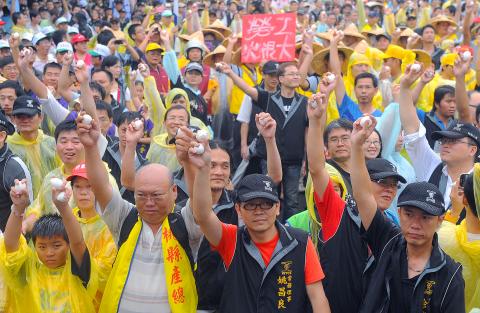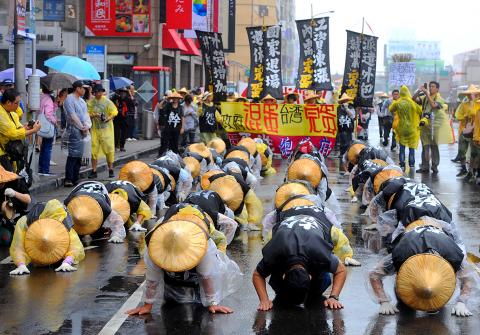Close to 2,000 workers and labor rights advocates yesterday bombarded Ketaglan Boulevard in front of the Presidential Office with eggs while tussling with police as they protested against low wages, unfair labor policies, rising prices and a growing labor insurance deficit.
Despite attempts from the police to calm the crowd, the angry workers — mobilized by various labor organizations, including the Labor Party, Taiwan International Workers’ Association (TIWA), Raged Citizens Act Now and unions from across the country — threw eggs in the direction of the Presidential Office, though they were kept 300m away from the building itself by a line of police.
“Down with the government! Taiwan is finished!” they chanted as they threw eggs across the police line.

Photo Wang Min-wei, Taipei Times
Failing to stop the crowd, hundreds of police officers in riot gear could do nothing but stand behind two large nets and hold their shields high to prevent eggs from hitting them.
Occasionally, officers would advance from behind the police line, trying to arrest protesters who threw more dangerous items, such as smoke bombs, but they were quickly surrounded by the crowd, trying to rescue their fellow protesters, sparking clashes between the two sides.
The demonstration was held in response to several developments affecting labor rights, including the Cabinet’s decision to only partially agree to the Council of Labor Affairs’ proposal to raise the legal minimum wage, the Cabinet’s plan to relax restrictions on hiring foreign laborers and its mulling having separate minimum wages for domestic and foreign workers.

Photo Wang Min-wei, Taipei Times
It also follows the news that the labor insurance system could go broke within two decades and that the government was considering increasing premiums for those who are working, but cutting payments to retired workers.
“President Ma Ying-jeou [馬英九] said that he would work to revive the economy, but when we look at the policies that the government came up with, it’s not hard to realize that they are not working to revive the economy for all, they only work for the benefit of the few,” Taipei City Confederation of Trade Unions secretary-general Chiang Wan-chin (蔣萬金) told the crowd. “They are working for the benefit of big corporations and the wealthy.”
Chiang said that one of the measures that the government was mulling was the relaxation of restrictions on the number of foreign workers that a business may hire.
“This is going to help the big corporations because they can cut costs by hiring more foreign workers and laying off domestic workers,” he said.
TIWA secretary-general Chen Hsiu-lien (陳秀蓮) criticized the government’s proposal to have separate minimum wages for foreign workers and domestic workers.
“If an employer could hire a foreign worker for NT$15,000 a month, why would he or she hire a domestic worker for NT$35,000?” Chen asked.
Chen said that decades ago, big businesses threatened to move their production units overseas unless the government agreed to allow them to import foreign workers, but despite being allowed to hire foreign workers, they still moved their production overseas anyway.
“They are playing the same game again now, we should not be deceived again,” she said.

Tropical Storm Gaemi strengthened into a typhoon at 2pm yesterday, and could make landfall in Yilan County tomorrow, the Central Weather Administration (CWA) said yesterday. The agency was scheduled to issue a sea warning at 11:30pm yesterday, and could issue a land warning later today. Gaemi was moving north-northwest at 4kph, carrying maximum sustained winds near its center of up to 118.8kph and gusts of 154.8kph. The circumference is forecast to reach eastern Taiwan tomorrow morning, with the center making landfall in Yilan County later that night before departing from the north coast, CWA weather forecaster Kuan Shin-ping (官欣平) said yesterday. Uncertainty remains and

SEA WARNING LIKELY: The storm, named Gaemi, could become a moderate typhoon on Wednesday or Thursday, with the Taipei City Government preparing for flooding A tropical depression east of the Philippines developed into a tropical storm named Gaemi at 2pm yesterday, and was moving toward eastern Taiwan, the Central Weather Administration (CWA) said. Gaemi could begin to affect Taiwan proper on Tuesday, lasting until Friday, and could develop into a moderate typhoon on Wednesday or Thursday, it said. A sea warning for Gaemi could be issued as early as Tuesday morning, it added. Gaemi, the third tropical storm in the Pacific Ocean this typhoon season, is projected to begin moving northwest today, and be closest to Taiwan on Wednesday or Thursday, the agency said. Today, there would likely

DISRUPTIONS: The high-speed rail is to operate as normal, while several airlines either canceled flights or announced early departures or late arrivals Schools and offices in 15 cities and counties are to be closed today due to Typhoon Gaemi, local governments announced last night. The 15 are: Taipei, New Taipei City, Taoyuan, Tainan, Keelung, Hsinchu and Kaohsiung, as well as Yilan, Hualien, Hsinchu, Miaoli, Chiayi, Pingtung, Penghu and Lienchiang counties. People should brace for torrential rainfall brought by the storm, with its center forecast to make landfall on the east coast between tonight and tomorrow morning, the Central Weather Administration (CWA) said. The agency issued a sea warning for the typhoon at 11:30pm on Monday, followed by a land warning at 11:30am yesterday. As of

CASUALTY: A 70-year-old woman was killed by a falling tree in Kaohsiung as the premier warned all government agencies to remain on high alert for the next 24 hours Schools and offices nationwide are to be closed for a second day today as Typhoon Gaemi crosses over the nation, bringing torrential rain and whipping winds. Gaemi was forecast to make landfall late last night. From Tuesday night, its outer band brought substantial rainfall and strong winds to the nation. As of 6:15pm last night, the typhoon’s center was 20km southeast of Hualien County, Central Weather Administration (CWA) data showed. It was moving at 19kph and had a radius of 250km. As of 3pm yesterday, one woman had died, while 58 people were injured, the Central Emergency Operation Center said. The 70-year-old